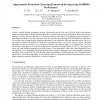Free Online Productivity Tools
i2Speak
i2Symbol
i2OCR
iTex2Img
iWeb2Print
iWeb2Shot
i2Type
iPdf2Split
iPdf2Merge
i2Bopomofo
i2Arabic
i2Style
i2Image
i2PDF
iLatex2Rtf
Sci2ools
JSS
2007
2007
Opportunistic prioritised clustering framework for improving OODBMS performance
In object oriented database management systems, clustering has proven to be one of the most effective performance enhancement techniques. Existing clustering algorithms are mainly static, that is re-clustering the object base when the database is off-line. However, this type of re-clustering cannot be used when 24-hour database access is required. In such situations dynamic clustering is necessary, since it can recluster the object base while the database is in operation. We find that most existing dynamic clustering algorithms do not address the following important points: the use of opportunism to impose the smallest I/O footprint for re-organisation; the re-use of prior research on static clustering algorithms; and the prioritisation of re-clustering so that the worst clustered pages are re-clustered first. Our main achievement in this paper is to create the Opportunistic Prioritised Clustering Framework (OPCF). The framework allows any static clustering algorithm to be made dyna...
| Added | 16 Dec 2010 |
| Updated | 16 Dec 2010 |
| Type | Journal |
| Year | 2007 |
| Where | JSS |
| Authors | Zhen He, Richard Lai, Alonso Marquez, Stephen Blackburn |
Comments (0)

